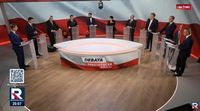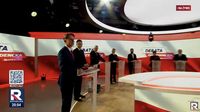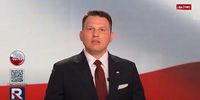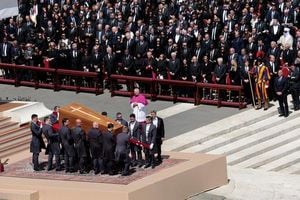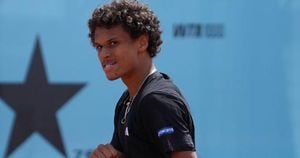On April 14, 2025, a highly anticipated presidential debate took place at the headquarters of Telewizja Republika, featuring ten candidates vying for the presidency of Poland. This debate was segmented into four thematic blocks: security, economy, healthcare, and international politics, and was hosted by Katarzyna Gójska. Notably absent from the debate were prominent candidates Rafał Trzaskowski and Magdalena Biejat, who both declined to participate.
The candidates present included Karol Nawrocki, Sławomir Mentzen, Szymon Hołownia, Adrian Zandberg, Grzegorz Braun, Marek Jakubiak, Joanna Senyszyn, Krzysztof Stanowski, Artur Bartoszewicz, and Marek Woch. The debate, expected to last about one and a half hours, aimed to address critical issues facing Poland as the presidential election approaches on May 18, 2025.
The first topic discussed was national security, prompting candidates to elaborate on their views regarding the role of the president as the commander-in-chief of the armed forces. Sławomir Mentzen emphasized his commitment to ensuring Polish security by refusing to send Polish soldiers to Ukraine, stating, "Without the president's consent, fortunately, soldiers cannot be sent to Ukraine. If I become president, no Polish soldier will end up in Ukraine, and no Polish soldier will die for Donbas or Crimea." He highlighted the dire state of Poland's military readiness, noting that the country produces as much artillery ammunition in a year as Ukraine uses in just three days of defense.
Mentzen's remarks were underscored by a stark warning from the head of the National Security Bureau (BBN), who indicated that Poland's defense could last only a week or two in the event of a Russian attack. He criticized the current laws surrounding the production of weapons and ammunition, arguing that they inhibit the establishment of new ammunition factories in Poland. "We need to change this law," he declared, stressing the urgency of enhancing Poland's military capabilities.
In response to questions about healthcare, Mentzen reiterated the Konfederacja party's proposal to return to a health insurance fund system, citing Poland's low ranking in global healthcare performance. "We are almost 60th in the world ranking of healthcare systems, behind Lebanon and Azerbaijan. Germany and Switzerland have competing healthcare systems that work well, and we should model ours after them," he asserted. He also proposed appointing a special team of experts to reform the healthcare system, led by Andrzej Sośnierz, a former president of the Silesian health insurance fund.
Karol Nawrocki, representing the right-wing Law and Justice party (PiS), also addressed security, stating that he would unilaterally denounce the migration pact and establish an office to combat illegal migration. He emphasized the need to strengthen Poland's position within NATO and foster bilateral relations with the United States, asserting, "Poland will be safe with me as president." Nawrocki also criticized the current government's handling of security issues, particularly regarding the country's porous western border.
The candidates were then asked whether they support Poland preparing to adopt the euro. Nawrocki firmly opposed the introduction of the euro, advocating instead for the stability of the Polish złoty. He articulated concerns over the rising cost of living, stating, "Today, inflation is rampant in Polish households, affecting 14 million households. As president, I will work to restore a 0% VAT on food and lower electricity prices by rejecting green taxes that harm the welfare of Polish families."
Mentzen echoed these sentiments, emphasizing the importance of maintaining Polish currency and rejecting the euro. He stated, "In Poland's interest, we must keep the Polish złoty. I am also in favor of cash rights and will veto any law that raises or complicates taxes." This sentiment was further supported by Grzegorz Braun, who vehemently opposed the euro, declaring, "Away with the euro, away with the euro-kolkhoz!"
As the debate progressed to healthcare, Szymon Hołownia proposed a systemic approach to healthcare reform, emphasizing that previous governments had failed to address the issue effectively. He stated, "We spend three times more on healthcare than ten years ago, yet patient satisfaction has not increased proportionally. If a bucket leaks, pouring more water into it won't solve the problem; we need to fix the bucket first." Hołownia's proposal included a commitment to develop a comprehensive health protection system within a year.
Adrian Zandberg suggested that Poland should allocate 8% of its GDP to public healthcare, arguing that this was necessary to address the aging population's needs. He highlighted the current budget's shortfall of over 20 billion zlotys for the functioning of healthcare. In contrast, Joanna Senyszyn criticized the government for its handling of healthcare funding, asserting that the burden of financing the system falls disproportionately on those with lower incomes.
In the final segment of the debate, candidates were asked about their views on the European Union and its federalization. Hołownia argued for a strong Polish presence within the EU, stating that Poland must be a powerful player in the union, while Braun called for reclaiming Poland's independence from international organizations. Zandberg emphasized the need for increased investments within the EU to ensure Poland's competitive edge against global powers.
The debate concluded with candidates reiterating their positions on various issues, each vying for voter support ahead of the upcoming election. The absence of Trzaskowski and Biejat, who have been leading figures in the campaign, added a layer of intrigue to the proceedings, as candidates sought to capitalize on their absence to gain traction among voters.
As the election date approaches, the candidates' differing views on key issues such as security, healthcare, and Poland's role in the EU will undoubtedly shape the political landscape in the coming weeks. The debates serve as a crucial platform for candidates to communicate their visions for Poland's future, with voters eager to hear how each candidate plans to address the pressing challenges facing the nation.
![Emocje w studiu Telewizji Republika. Karol Nawrocki atakuje Szymona Hołownię [RELACJA NA ŻYWO]](https://thumbor.evrimagaci.org/INS00g5q2VMKkYGvG-LU3Rj_XEo=/200x0/tpg%2Fsources%2Fe36dee52-af09-4d22-985b-4a1ac19184ee.jpeg)
